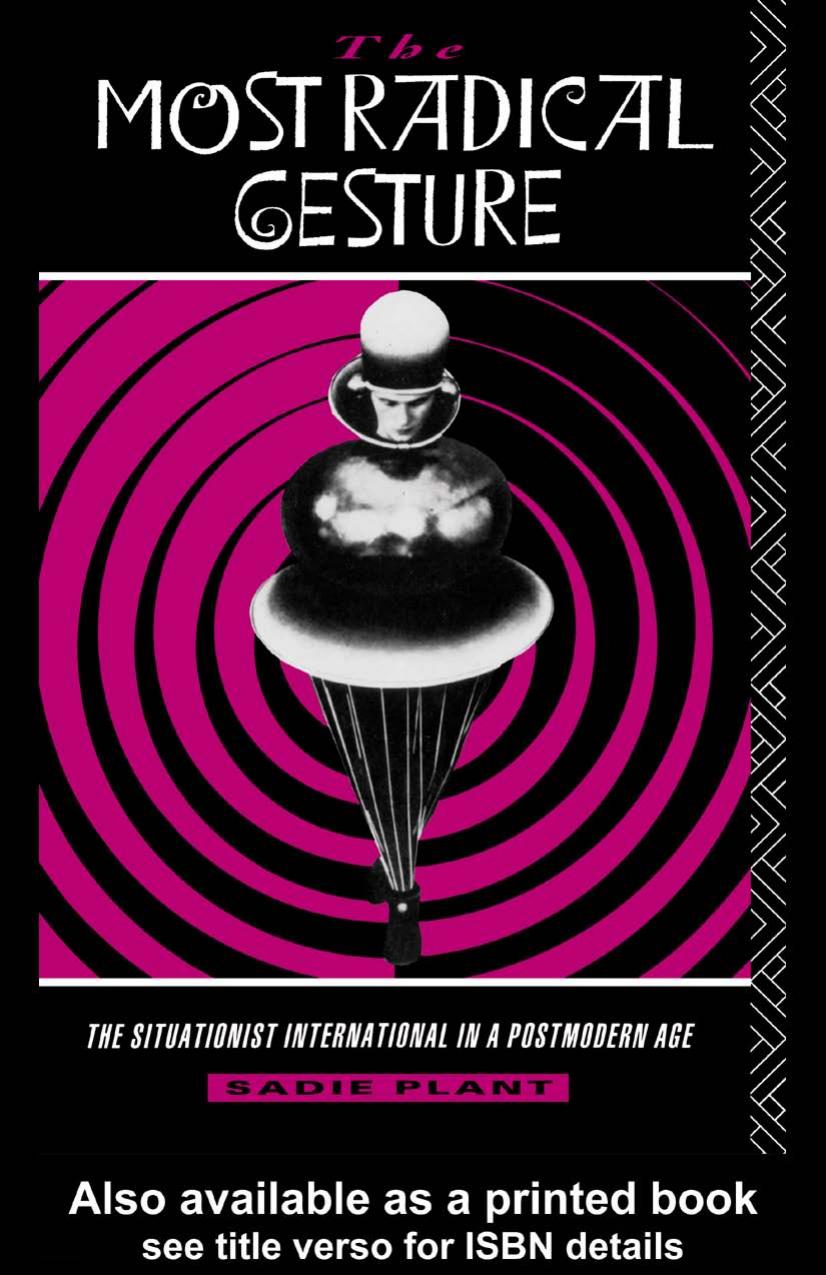The Most Radical Gesture: The Situationist International in a Postmodern Age by Sadie Plant

Author:Sadie Plant [Plant, Sadie]
Language: eng
Format: epub, pdf
Publisher: Routledge
Published: 1992-05-07T05:00:00+00:00
Chapter 4
'Victory will be for those who create disorder without loving it'
The May events have served as the common springboard for a great deal of subsequent intellectual enquiry. The line of imaginative dissent to which Dada, surrealism, the situationists, and the activists of 1968 belong continually reappears in the poststructuralist and desiring philosophies of the 1970s, and the postmodern world view to which they have led is itself laced with the remnants of this tradition. But it was the failure of the revolutionary movement which preoccupied this trajectory of post-68 philosophy, culminating in the postmodern insistence that criticism is impossible, subversion futile, and revolution a childish and reactionary dream. And as France returned to some sort of political normality, the possibility that the most basic and heartfelt presuppositions of revolutionary thought were fundamentally mistaken was raised over and again.
A cursory reading of poststructuralist thought leaves revolutionary theory without a leg to stand on. The situationist distinction between the real and the spectacle is rendered meaningless by the claim that there can be no real existence beyond that which appears in discourse, and the assertion that the desires and experiences of the subject are somehow more authentic than those represented in the spectacle collapses in the face of suggestions that subjectivity is itself produced by the networks of discourse in which we live. Notions of class, totality, and historical progress are completely undermined, and the idea that all social relations are somehow answerable to a single principle of economic functioning is rendered untenable. But although poststructuralism is in some senses a radical break with the situationist project, a host of continuities makes it impossible to oppose the two world views completely. The interests, vocabulary and style of the situationists reappear in Lyotard's railings against theory and Foucault's maverick intellectualism, and the desiring philosophies invoked by Deleuze and Guattari continue to offer words on the 'art of living'.1 The breadth of situationist theory and its magpie tactics of appropriation and détournement find their expression in the deconstructive eclecticism of poststructuralist writing, which similarly has no scruples about taking ideas, examples, and forms of expression from anywhere. Many poststructuralist texts are mixtures of poetry and philosophy, fiction and journalism; distinctions between disciplines, styles, and media are removed, and rigorous argument sits alongside unfounded speculation and unanswerable polemic. Like the situationists, they observe that the world now seems to be a decentred and aimless collection of images and appearances, characterise consciousness as fragmented, dispersed, and constructed by the social relations in which it arises, and declare the apparent impossibility of future progress and historical foundation. Situationist vocabularies of play, pleasure, and subversion reappear, and the politics of the everyday, consumerism, the media, the avant-garde, the city, language, and desire are themes common to both. Moreover, many theorists writing in the wake of 1968 continued the situationist search for some irrecuperable perspective from which an increasingly complex and all-encompassing social system could be opposed.
But these similarities do not extend to their conclusions. The situationists took
Download
The Most Radical Gesture: The Situationist International in a Postmodern Age by Sadie Plant.pdf
This site does not store any files on its server. We only index and link to content provided by other sites. Please contact the content providers to delete copyright contents if any and email us, we'll remove relevant links or contents immediately.
| Anthropology | Archaeology |
| Philosophy | Politics & Government |
| Social Sciences | Sociology |
| Women's Studies |
Nudge - Improving Decisions about Health, Wealth, and Happiness by Thaler Sunstein(7711)
The Fire Next Time by James Baldwin(5452)
iGen by Jean M. Twenge(5418)
Adulting by Kelly Williams Brown(4579)
The Sports Rules Book by Human Kinetics(4393)
The Hacking of the American Mind by Robert H. Lustig(4386)
The Ethical Slut by Janet W. Hardy(4261)
Captivate by Vanessa Van Edwards(3842)
Mummy Knew by Lisa James(3694)
In a Sunburned Country by Bill Bryson(3544)
The Worm at the Core by Sheldon Solomon(3489)
Ants Among Elephants by Sujatha Gidla(3468)
The 48 laws of power by Robert Greene & Joost Elffers(3294)
Suicide: A Study in Sociology by Emile Durkheim(3024)
The Slow Fix: Solve Problems, Work Smarter, and Live Better In a World Addicted to Speed by Carl Honore(3012)
The Tipping Point by Malcolm Gladwell(2929)
Humans of New York by Brandon Stanton(2873)
Get What's Yours for Medicare: Maximize Your Coverage, Minimize Your Costs by Philip Moeller(2755)
Handbook of Forensic Sociology and Psychology by Stephen J. Morewitz & Mark L. Goldstein(2705)
